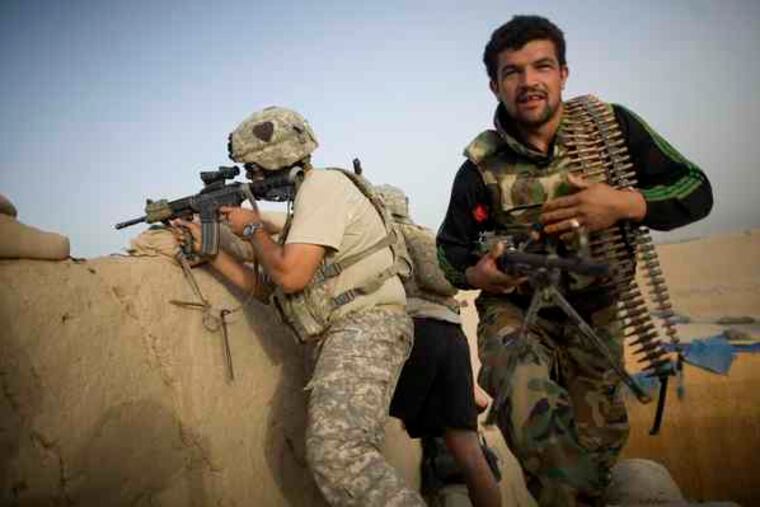Afghan war-fund hike OKd by House
The package includes a $33 billion boost for Obama's troop surge.

WASHINGTON - The House on Tuesday sent President Obama a major war-funding increase of $33 billion to pay for his troop surge in Afghanistan, unmoved by the leaking of classified documents that portray a military effort struggling between 2004 and 2009 against a strengthening insurgency.
The House voted 308-114 to approve the spending boost for the additional 30,000 U.S. troops in Afghanistan. Other nonwar provisions brought the total bill to nearly $59 billion.
From Obama on down, the disclosure of the documents was condemned Tuesday by administration officials and military leaders. The bad news for the White House: A pervasive weariness with the war exists and may be growing.
Republicans in Congress still were strongly behind the boost in war spending, but there was unusually strong opposition from members of Obama's own party. All but 12 of the "no" votes in the House came from Democrats.
All Philadelphia-area representatives voted in favor of the bill except Rep. Chaka Fattah (D., Pa.), who voted against it.
In debate before the vote, Rep. Jim McGovern (D., Mass.) said the leaked documents revealed corruption and incompetence in the Afghan government. "We're told we can't extend unemployment or pay to keep cops on the beat or teachers in the classroom," he said, "but we're asked to borrow another $33 billion for nation-building in Afghanistan."
At a Senate Foreign Relations Committee hearing on prospects for a political settlement of the Afghan conflict, there was scant mention of the leaked material by the whistle-blower group WikiLeaks, but there were repeated expressions of frustration over the direction of the fighting.
Massachusetts Sen. John Kerry, who heads the panel, has questioned the realism of U.S. goals in Afghanistan though he supports the war. He pointedly asked why the Taliban, with fewer resources and smaller numbers, can field fighters who are more committed to winning than are Afghan soldiers.
"What's going on here?" Kerry asked with exasperation.
But Sen. John McCain (R., Ariz.), a vocal supporter of the war, took issue at a separate hearing with anyone who would argue that the leaked documents buttressed arguments for withdrawing now from Afghanistan.
"In actuality, the emerging picture from these documents appears to be little more than what we knew already: that the war in Afghanistan was deteriorating over the past several years," he said.
Marine Corps Gen. James Mattis told senators at a hearing Tuesday on his nomination to lead the military's Central Command that, whatever other lessons are drawn from the WikiLeaks documents, no one should doubt that the United States is committed to staying in Afghanistan until it wins.
"We are on the right track now," Mattis said, while predicting that the U.S. casualty rate would increase in coming months as still more U.S. troops joined the fight against the Taliban.
Obama, in his first public comments on the weekend leak of tens of thousands of documents, said it could "potentially jeopardize individuals or operations" in Afghanistan. But he also said the papers did not reveal any concerns that were not already part of the war debate.
Obama said the shortcomings in Afghanistan as reflected in the leaked documents explained why, last year, he undertook an in-depth review of the war and developed a new strategy.
"We've substantially increased our commitment there, insisted upon greater accountability from our partners in Afghanistan and Pakistan, developed a new strategy that can work, and put in place a team, including one of our finest generals, to execute that plan," Obama said. "Now we have to see that strategy through."
In the House, Appropriations Committee Chairman David R. Obey (D., Wis.) said he was torn between his obligation to bring the bill to the floor and his "profound skepticism" that the money would lead to a successful conclusion of the war.
Even if there were greater confidence, he said, "it would likely take so long it will obliterate our ability to make the kinds of long-term investments in our own country that are so desperately needed."
The leaked documents are battlefield reports compiled by various military units in Afghanistan that provide an unflinching view of combat operations between 2004 and 2009, including U.S. displeasure over reports that Pakistan secretly aided insurgents fighting U.S. and Afghan forces.
Even as the administration dismissed the leaked documents as outdated, U.S. military and intelligence analysts were caught in a struggle to limit the damage contained in the once-secret files now scattered across the Internet.
Officials are concerned about the impact the disclosures could have on the military's human-intelligence network built up over the last eight years inside Afghanistan and Pakistan. The people in that network range from Afghan village elders who have worked behind the scenes with U.S. troops to militants working as double agents.
Beyond expressions of disgust at the release of the documents, the political fallout in Washington appeared limited. At the State Department, spokesman P.J. Crowley said efforts to explain to Afghanistan and other allies that the U.S. government played no role in leaking the documents seemed to have paid off.
"We're very gratified that the response thus far internationally has been moderate, sober," Crowley said.